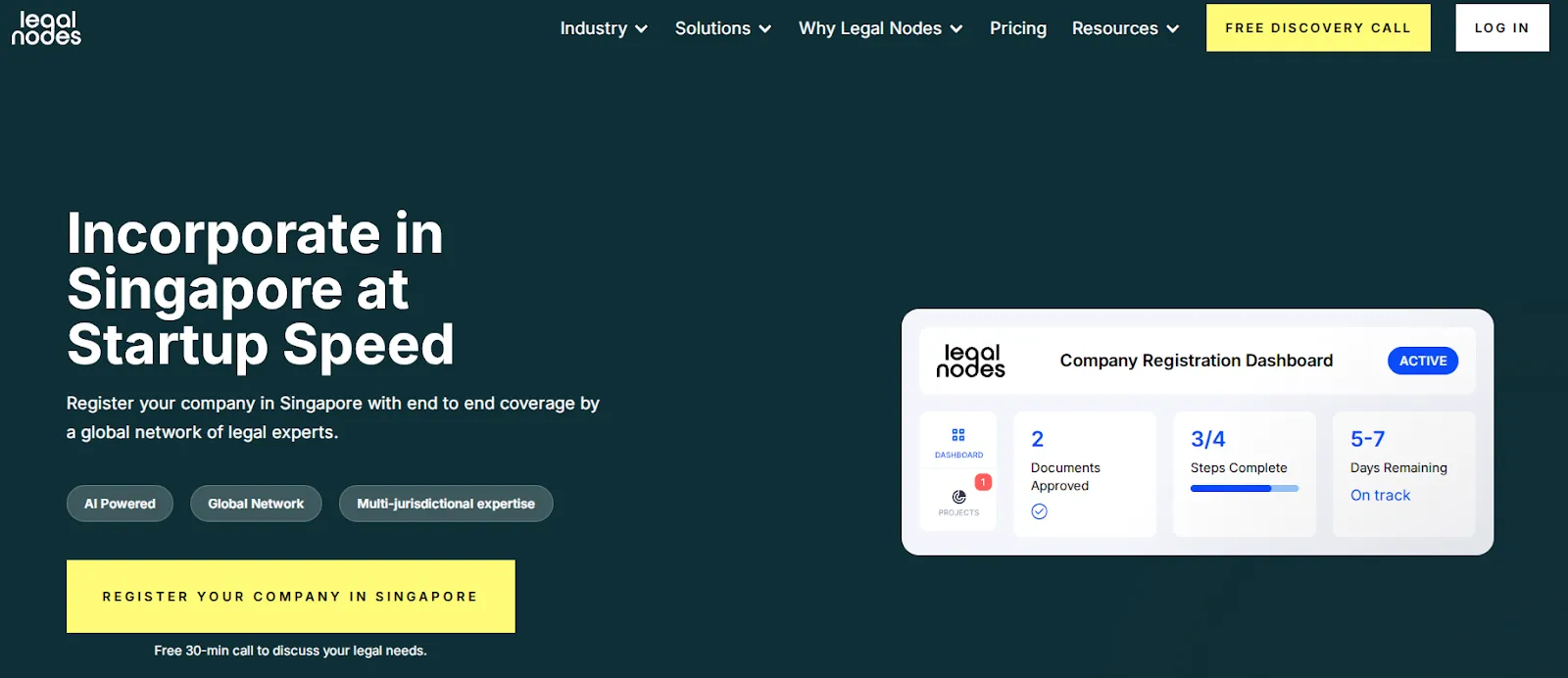Starting a business in Singapore opens doors to one of Asia’s most business-friendly environments.
It helps you establish legitimacy, gain trust from clients and investors, and access government support and incentives.
This guide covers everything from choosing your business structure to opening bank accounts and getting work visas.
You’ll find the step-by-step process, compliance tips, and insights to help you avoid common pitfalls that delay other entrepreneurs.
Key Takeaways
- You can register a company in Singapore in 1–3 business days with minimal paperwork.
- 100% foreign ownership is allowed, making Singapore highly attractive for international entrepreneurs.
- The most popular structure for startups is a Private Limited Company (Pte Ltd), offering limited liability, credibility, and growth flexibility.
- You need at least one Singapore-resident director, a minimum S$1 paid-up capital, a local registered address and a company secretary appointed within 6 months.
- Startups enjoy up to 75% corporate tax exemption on the first S$100,000 income for the first three years.
- Foreigners must use registered filing agents to complete the process.
- Post-registration compliance is key—maintain annual filings, appoint a company secretary, keep statutory records, and meet tax obligations.
Legal Nodes handles everything from name reservation to banking setup—ensuring a smooth, compliant, and fast incorporation process without paperwork headaches.
Ready to launch your Singapore business? Book your free consultation and get your custom registration plan today.
The Basics of Singapore Company Registration

Image source: Unsplash
The Singapore government offers streamlined business registering through ACRA (Accounting and Corporate Regulatory Authority). You submit everything online with their BizFile+ system.
The process starts at a S$315 registration fee, which covers the application and official documentation, and hardly needs any paperwork, making Singapore one of the fastest places to launch a new business entity anywhere.
Registering secures legal status, access to grants, and tax incentives. Over 4,000 new businesses launch monthly, joining a thriving ecosystem of startups and global firms.
The Private Limited Company (Pte Ltd) is a popular local company setup because it gives you limited liability, helps you build credibility, and offers plenty of room for growth.
That’s what makes Singapore such a great place for entrepreneurs who want things done quickly, efficiently, and with a solid business framework.
Benefits of Registering a Company in Singapore

Image source: Unsplash
Registering a business in Singapore has legal, financial and growth benefits for entrepreneurs:
- 17% corporate tax rates with startup exemptions
- Limited liability that protects personal assets
- Instant credibility through public registration
- Access to Asia’s markets through a strategic location
- Strong IP protection and legal stability
- Eligibility for grants, VC funding and bank financing
Incorporation separates personal and business finances, reduces risk and opens up tax and market opportunities, making Singapore the best place to launch and scale a startup.
Legal Nodes: Your Partner for Singapore Company Registration

Legal Nodes is an AI-powered legal platform that assists with Singapore company registration and compliance, helping you avoid common registration issues with expert guidance and efficient processes.
Our team of experts supports you with:
- ACRA filing requirements and documentation
- Finding qualified local directors and meeting residency rules
- Understanding MAS regulations for fintech
- Following ongoing compliance after incorporation
Legal Nodes provides end-to-end company registration with direct access to Singapore legal specialists. You get jurisdiction fit analysis and personalized advice to make sure Singapore matches your business model and expansion goals.
You can expect:
- Real-time tracking: Dashboard shows every registration step
- Banking-ready setup: Corporate structures built for easy account opening
- Investor compliance: Entities structured to meet funding needs
With Legal Nodes, you can complete Singapore company registration within 5-7 business days and dodge delays from wrong filings or missing paperwork.
Ideal for fintech, trading, and traditional tech companies looking to expand into Asia via Singapore’s business-friendly environment.
If you’re ready to start your Singapore company registration, schedule a free discovery call with Legal Nodes experts.
Types of Business Entities in Singapore

Image source: Unsplash
Your business structure affects taxes, liability, and growth potential. Singapore offers several legally recognized entity types, each with unique compliance requirements.
Local business entities
- Sole Proprietorship: Easiest setup; full control but unlimited personal liability.
- Partnership: 2–20 partners share profits and liabilities.
- Limited Partnership (LP): Combines general partners with unlimited liability and limited partners (investors) with liability capped at their investment.
- Limited Liability Partnership (LLP): Separate legal entity; partners are liable only for their actions.
- Private Limited Company (Pte Ltd) – Most popular; offers full liability protection, shareholder control, asset ownership, quick access to funding and credibility with investors.
Options for foreign companies
- Branch office: Extension of a foreign parent business; not a separate legal entity. The parent company remains liable for its debts and obligations.
- Representative office: Temporary, non-commercial presence for market research, feasibility studies or product and service promotion.
- Subsidiary company: Locally incorporated private company, majority-owned by foreign parent; enjoys limited liability and operational independence.
How to Choose the Right Business Structure in Singapore

Image source: Unsplash
Think about your capital, ownership plans, and risk comfort before you decide:
- How much money will you invest upfront?
- Will you have business partners or investors?
- Do you want personal asset protection?
- Will you scale quickly or stay small?
Your company structure sets your share capital needs. Pte Ltd companies need at least $1 paid-up capital, while sole proprietorships don’t have minimums.
If you plan to take business risks, limited liability is a must. Pick Pte Ltd if you want to attract investors or go global.
Think about how easy it is to close the business later. Some structures are a pain to dissolve and cost more.
It’s worth pausing to picture your long-term goals before making this call.
How to Register a Business in Singapore

Image source: Pixabay
You can register a company in Singapore via ACRA’s online portal in a day if you have all the documents ready.
Foreigners must use registered filing agents, while locals can access BizFile+ directly.
The filing agent will handle legal filings with ACRA, ensure compliance, and assist with key registration requirements:
- Decide on your business structure
- Get your business name approved by ACRA. If you add descriptive words to your business name, you may need to meet additional registration requirements under ACRA’s guidelines.
- At least one director (Singapore citizen, PR, or work pass holder)
- Registered business address in Singapore (not a P.O. box)
- Company secretary appointment within 6 months
- Minimum paid-up capital of SGD 1
Key documents needed
- Director and shareholder identification documents
- Proof of residential address for all parties
- Details of your proposed business activities
- Share capital structure information
- The company’s constitution (Memorandum and Articles of Association)
Your company registration certificate confirms your business is legally established and ready to operate in Singapore.
Singapore Employment Pass and Work Visas for Foreigners

Image source: Pixabay
Foreign professionals need valid work passes to run businesses in Singapore.
The Employment Pass (EP) allows managerial-level foreigners to work legally while managing their companies.
Foreign parent companies can set up subsidiaries and sponsor EPs or other passes for staff.
Other key work pass options include:
- EntrePass: For innovative entrepreneurs in tech/biomedical sectors
- S Pass: For mid-level skilled workers earning S$3,150+ monthly
Employment pass requirements
Applicants need recognized qualifications, relevant experience, and must meet Fair Consideration Framework rules.
The COMPASS points system checks applications for skills, diversity, and economic contribution. You need at least 40 points to qualify.
Application process
Apply through Singapore's Ministry of Manpower online portal with degree certificates, employment history, and salary proof.
Prepare yourself for:
- Application fee: S$105
- Issuance fee: S$225
- Processing time: 3 weeks
- Validity: 1-2 years (renewable)
Foreign businesses must comply with local employment regulations when sponsoring work passes for international staff.
How to Set Up a Corporate Bank Account in Singapore

Image source: Pixabay
After registering your company, separate your personal and business finances.
Singapore banks follow Anti-Money Laundering (AML) and Countering Financing of Terrorism (CFT) rules set by the Monetary Authority of Singapore (MAS) under notices such as MAS Notice 626.
Choose the right bank
Local banks like DBS, OCBC, and UOB offer solid services for startups. International banks such as HSBC and Standard Chartered are also options.
Digital banks like Wise and Aspire offer faster setup and lower fees.
Consider these factors when picking your financial institutions:
- Processing time (1-2 days for locals, several weeks for foreigners)
- Minimum deposit requirements
- Monthly maintenance fees
- Multi-currency support
Required documents
Singaporean-owned companies need minimal documents. Foreign-owned companies need extra documents for identity checks and background screening.
Key documents include:
- Certificate of incorporation
- Business registration documents
- Directors' identification and proof of address
- Business plan and financial projections
- Memorandum and Articles of Association
The application process
Banks conduct Customer Due Diligence to verify your business's legitimacy. They’ll look at your company structure, business activities, and stakeholder backgrounds.
Foreign founders might have to do video interviews instead of meeting in person. Banks will evaluate your risk profile based on your business finances and operational plans.
Digital banking alternatives onboard startups faster if you need bank account access right away. Traditional banks offer more services, but expect slower processing times.
Post-Registration Compliance and Requirements

Image source: Pixabay
After incorporating your business in Singapore, you need to meet ongoing compliance requirements to stay in good standing with government agencies.
These obligations keep your company legal and help you avoid penalties.
Appointing a company secretary
You have to appoint a company secretary within six months of incorporation. The company secretary ensures regulatory compliance and keeps statutory registers up to date.
The company secretary has legal obligations under local laws, including ensuring compliance with the Companies Act and other statutory duties.
Your company secretary handles filings with the Accounting and Corporate Regulatory Authority (ACRA). They also prepare annual returns and update your company’s constitution when needed.
Annual filing and tax obligations
You need to file annual returns with ACRA within one month after your Annual General Meeting. Financial records must follow Singapore Financial Reporting Standards.
The Inland Revenue Authority requires corporate tax returns by November 30 for paper submissions, or December 15 if filing electronically.
Companies with an annual turnover of over SGD 1 million must register for GST.
Maintaining corporate records
Your business must keep accurate statutory records and financial records for at least five years, as required by local laws, including shareholder meeting minutes, board resolutions, and transaction records.
Keep several statutory records at your registered office:
- Register of Members
- Register of Directors
- Register of Secretaries
- Register of Charges
Report any changes to your business profile, directors, or company address to ACRA within 14 days. It keeps your post-registration compliance obligations current.
Consider protecting your intellectual property with trademark and patent registration to safeguard your business assets.
Conclusion on How to Register a Business in Singapore
Registering your business in Singapore takes just 1-3 business days and costs around SGD 315 for a private limited company.
The digital registration process through ACRA makes it one of the fastest business setups globally.
The post-registration phase requires ongoing attention. Open a corporate bank account, ensure annual compliance, and register for GST if your revenue exceeds SGD 1 million.
Legal Nodes simplifies your entire Singapore business registration journey. You'll get access to experienced incorporation specialists who handle every detail from name reservation to compliance setup.
Why struggle with complex paperwork when Legal Nodes makes registration effortless?
Book a free consultation call with our incorporation specialists today.
FAQs on How to Register a Business in Singapore
How much does it cost to register a business in Singapore?
The basic ACRA filing fee is S$300 for company registration and S$15 for name reservation if you want to secure your business name first.
Additional costs include registered office rental, company secretary fees, and legal documentation. Most entrepreneurs spend between S$500 and S$1,500 total for the complete setup.
Can foreigners register a business in Singapore?
Yes, foreigners can easily register a business in Singapore. Singapore welcomes international entrepreneurs with minimal restrictions.
You need at least one local director who is either a Singapore citizen, permanent resident, or holds an employment pass. This person must be ordinarily resident in Singapore.
No minimum capital requirement exists for most business types. The process is straightforward and business-friendly.
Do small businesses need to register in Singapore?
All businesses operating in Singapore must register with ACRA, no matter the size. Even sole proprietorships require proper registration before you can legally conduct business activities.
Registration is mandatory whether you're running a home-based business or planning to expand internationally. Operating without registration carries legal penalties.
The process protects your business name and gives you legal recognition for banking and contracts.
Can a foreigner own 100% of a business in Singapore?
Foreigners can own 100% of most Singapore businesses, and there usually aren't any restrictions. You get to keep complete control over your company shares and how you run things.
You'll just need to appoint a local director. This person doesn't have to own any part of the company—they're mainly there for compliance reasons.
Certain regulated industries might set limits on foreign ownership. But for most regular business activities, full foreign control is totally fine.
